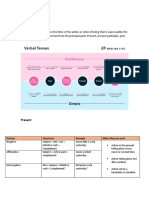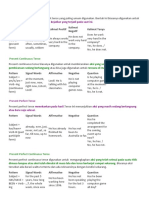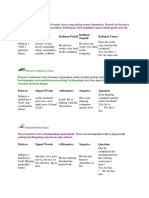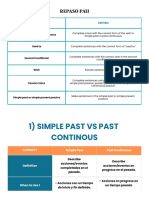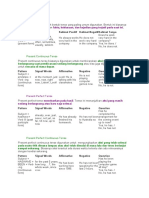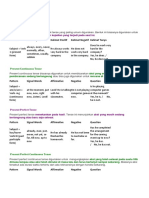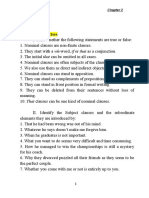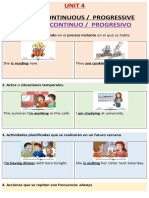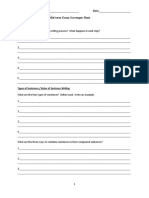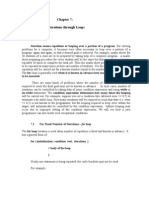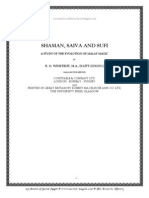0 ratings0% found this document useful (0 votes)
115 viewsPresent Simple Present Continuous Present Perfect: English Tenses
Present Simple Present Continuous Present Perfect: English Tenses
Uploaded by
Khaled AdelThe document summarizes the main English tenses:
1) The Present Simple tense expresses habitual or repeated actions in the present, such as "He uses his phone every day".
2) The Present Continuous tense expresses actions happening now in the present, such as "They are watching TV now". It can also refer to the future.
3) The Present Perfect tense expresses actions that happened in the past but their effects are still felt in the present, or actions that just finished moments ago, such as "He has just finished his homework".
Copyright:
© All Rights Reserved
Available Formats
Download as PDF, TXT or read online from Scribd
Present Simple Present Continuous Present Perfect: English Tenses
Present Simple Present Continuous Present Perfect: English Tenses
Uploaded by
Khaled Adel0 ratings0% found this document useful (0 votes)
115 views1 pageThe document summarizes the main English tenses:
1) The Present Simple tense expresses habitual or repeated actions in the present, such as "He uses his phone every day".
2) The Present Continuous tense expresses actions happening now in the present, such as "They are watching TV now". It can also refer to the future.
3) The Present Perfect tense expresses actions that happened in the past but their effects are still felt in the present, or actions that just finished moments ago, such as "He has just finished his homework".
Original Title
Untitled
Copyright
© © All Rights Reserved
Available Formats
PDF, TXT or read online from Scribd
Share this document
Did you find this document useful?
Is this content inappropriate?
The document summarizes the main English tenses:
1) The Present Simple tense expresses habitual or repeated actions in the present, such as "He uses his phone every day".
2) The Present Continuous tense expresses actions happening now in the present, such as "They are watching TV now". It can also refer to the future.
3) The Present Perfect tense expresses actions that happened in the past but their effects are still felt in the present, or actions that just finished moments ago, such as "He has just finished his homework".
Copyright:
© All Rights Reserved
Available Formats
Download as PDF, TXT or read online from Scribd
Download as pdf or txt
0 ratings0% found this document useful (0 votes)
115 views1 pagePresent Simple Present Continuous Present Perfect: English Tenses
Present Simple Present Continuous Present Perfect: English Tenses
Uploaded by
Khaled AdelThe document summarizes the main English tenses:
1) The Present Simple tense expresses habitual or repeated actions in the present, such as "He uses his phone every day".
2) The Present Continuous tense expresses actions happening now in the present, such as "They are watching TV now". It can also refer to the future.
3) The Present Perfect tense expresses actions that happened in the past but their effects are still felt in the present, or actions that just finished moments ago, such as "He has just finished his homework".
Copyright:
© All Rights Reserved
Available Formats
Download as PDF, TXT or read online from Scribd
Download as pdf or txt
You are on page 1of 1
English Tenses
Present Simple Present Continuous Present Perfect
.. الفعل في التصريف األول
Form يتكون من )He. She .it ( معS مع إضافة
am , is , are + V + ing have , has + P.P
use يعبر عن عادة متكررة أو حقيقة علمية
يعبر عن حدث يحدث اآلن أو مازال تأثيره.حدث في الماضي ومازال
االستخدام كما يعبر عن المستقبل . موجود أو انتهي قبل لحظات قليلة
always .often . usually.
Key Words Sometimes . rarely .seldom,
now , look , listen , at the moment , since , for , just , already , ever
الكلمات الدالة never . every (day/week….)
at the present time . never , yet , recently , lately
Negation النفي don't .doesn't isn't , aren't haven't , hasn't
Example I get up at six everyday They are watching television now He has just finished his H.W
Past Simple Past Continuous Past Perfect
Form يتكون من )الفعل في التصريف الثاني (الماضي was, were + V + ing had + P.P
use يعبر عن حدث في الماضي وانتهي
يعبرعن حدث كان مستمرا في الماضي أو تحديد وقت حدث حصل و انتهى قبل حدث آخر في
أو ترتيب حدثين في الماضي. معين في الماضي .الماضي
االستخدام
yesterday , last , ago , in 1999 , while+ past continuous +p. simple After +past perfect +past simple
Key Words once , one day , when + past simple +p. continuous Before +past simple +past perfect
الكلمات الدالة in the past as =just as = while < All . At 7.00 after = as soon as
before = by the time
Negation النفي didn't wasn't , weren't hadn't
A thief entered my room while I I had washed before I prayed
Example I watched television last night
was sleeping
You might also like
- ESL - English as a Second Language - Verbs: a QuickStudy Digital Reference GuideFrom EverandESL - English as a Second Language - Verbs: a QuickStudy Digital Reference GuideNo ratings yet
- Tense Chart For Translation From Punjabi To EnglishDocument9 pagesTense Chart For Translation From Punjabi To Englishcharanjit100% (1)
- Iwcf Q&aDocument91 pagesIwcf Q&aKhaled Adel100% (1)
- Iq TestDocument4 pagesIq Testduca6htbn100% (1)
- The Unpacking The Self: The Spiritual Self (The Practice of Religion)Document5 pagesThe Unpacking The Self: The Spiritual Self (The Practice of Religion)Michelle Loma100% (1)
- Tabla Tiempos VerbaleschatgptDocument1 pageTabla Tiempos Verbaleschatgptbgnqd8nxkgNo ratings yet
- Verb TensesDocument20 pagesVerb Tensesvpetrovaa23No ratings yet
- Present and Past TensesDocument3 pagesPresent and Past TensesAia NikolovaNo ratings yet
- Simple Present or Present Simple: Tense Signal WordsDocument12 pagesSimple Present or Present Simple: Tense Signal Wordsusako_chanNo ratings yet
- English TensesDocument2 pagesEnglish TensesElviyasaNo ratings yet
- Verbal Times Review: Structures Example When They Are UsedDocument4 pagesVerbal Times Review: Structures Example When They Are UsedDiego GonzalezNo ratings yet
- 2 - Verb Tenses - PpsDocument41 pages2 - Verb Tenses - PpscristtianoNo ratings yet
- ReportpassiveDocument2 pagesReportpassiveSeokjinnie FresitaNo ratings yet
- Tiempos VerbalesDocument6 pagesTiempos VerbalesMaria Ines RoqueNo ratings yet
- Rumus Kata Sinyal Kalimat Positif Kalimat Negatif Kalimat TanyaDocument5 pagesRumus Kata Sinyal Kalimat Positif Kalimat Negatif Kalimat TanyaSiti NurhayatiNo ratings yet
- Tenses Table 2Document6 pagesTenses Table 2johana ConalNo ratings yet
- Infografía Diferencias Entre Investigación Cualitativa y Cuantitativa Simple Azul (Documento (A4) )Document1 pageInfografía Diferencias Entre Investigación Cualitativa y Cuantitativa Simple Azul (Documento (A4) )dmever206No ratings yet
- Verb Tenses: Star TrekDocument8 pagesVerb Tenses: Star TrekodethNo ratings yet
- Tiempos Verbales Tabla UsosDocument3 pagesTiempos Verbales Tabla Usossilcab67No ratings yet
- Eng Verb Tenses PDFDocument8 pagesEng Verb Tenses PDFEnilda ReyesNo ratings yet
- Grammar Tenses OverviewDocument1 pageGrammar Tenses Overview225643No ratings yet
- Present Simple Present Continuous: He o LLDocument12 pagesPresent Simple Present Continuous: He o LLLNo ratings yet
- Checklist Present PerfectDocument1 pageChecklist Present PerfectNurgul LadyNo ratings yet
- EnglishDocument11 pagesEnglishSusanNo ratings yet
- Grammar Tenses Table PDFDocument2 pagesGrammar Tenses Table PDFDaniel MiuNo ratings yet
- Fakta, Kebiasaan, Dan Kejadian Yang Terjadi Pada Saat IniDocument6 pagesFakta, Kebiasaan, Dan Kejadian Yang Terjadi Pada Saat InimofetNo ratings yet
- Resumen de InglésDocument8 pagesResumen de Inglésmapaus07No ratings yet
- Fakta, Kebiasaan, Dan Kejadian Yang Terjadi Pada Saat IniDocument6 pagesFakta, Kebiasaan, Dan Kejadian Yang Terjadi Pada Saat IniBunda CayaNo ratings yet
- Grammar 16 TensesDocument5 pagesGrammar 16 Tensesbrigitta aprillyaNo ratings yet
- Gramatika Engleskog JezikaDocument3 pagesGramatika Engleskog JezikaducamorisNo ratings yet
- Verb TensesDocument35 pagesVerb TensesGlaiza VillaverNo ratings yet
- Present Perfect TenseDocument7 pagesPresent Perfect TenseJunior Z FranciaNo ratings yet
- Past PerfectDocument6 pagesPast PerfectNico ReiNo ratings yet
- TensesDocument3 pagesTensesmissimanaminaNo ratings yet
- 16 TensesDocument4 pages16 TensesRisqa IzzatulNo ratings yet
- Obisnuite, Repetate.: Present SimpleDocument2 pagesObisnuite, Repetate.: Present SimpleAnda AdaNo ratings yet
- Aptis BookDocument174 pagesAptis Bookdarkpechuga59No ratings yet
- Gramatica para InglesDocument12 pagesGramatica para InglesAlex Eduard Campos LealNo ratings yet
- Simple Past vs. Present PerfectDocument16 pagesSimple Past vs. Present PerfectAnnisa Nurul HanifahNo ratings yet
- Fakta, Kebiasaan, Dan Kejadian Yang Terjadi Pada Saat IniDocument5 pagesFakta, Kebiasaan, Dan Kejadian Yang Terjadi Pada Saat IniHusni MubarokNo ratings yet
- Fakta, Kebiasaan, Dan Kejadian Yang Terjadi Pada Saat IniDocument7 pagesFakta, Kebiasaan, Dan Kejadian Yang Terjadi Pada Saat IniROSSITANo ratings yet
- Present PerfectDocument10 pagesPresent PerfectKris BruscattoNo ratings yet
- 2 - Tenses-Part1Document56 pages2 - Tenses-Part1drlalbihariNo ratings yet
- Introduction To Verb TensesDocument11 pagesIntroduction To Verb Tensesakshatsahni425No ratings yet
- TENSES ReviewDocument2 pagesTENSES ReviewElePra23No ratings yet
- Unidad 5Document7 pagesUnidad 5CarlosHernadezNo ratings yet
- Present Simple: Always, Ussualy.Document11 pagesPresent Simple: Always, Ussualy.epincarrNo ratings yet
- Mid Grammer PDFDocument9 pagesMid Grammer PDFabdullahaljadayehNo ratings yet
- Doc1 1Document1 pageDoc1 1maherashraf660No ratings yet
- Reported SpeechDocument4 pagesReported SpeechthecookiesclassNo ratings yet
- Functions of The Passive VoiceDocument10 pagesFunctions of The Passive VoicevalentinNo ratings yet
- Ingles EstructurasDocument1 pageIngles EstructurasNaobi Porras MillánNo ratings yet
- Rumus Kata Sinyal Kalimat Positif Kalimat Negatif Kalimat TanyaDocument6 pagesRumus Kata Sinyal Kalimat Positif Kalimat Negatif Kalimat TanyaSutanto SarumahaNo ratings yet
- TENSESDocument3 pagesTENSESelfani fernandaNo ratings yet
- Rumus Kata Sinyal Kalimat Positif Kalimat Negatif Kalimat TanyaDocument5 pagesRumus Kata Sinyal Kalimat Positif Kalimat Negatif Kalimat Tanyalydia amaliaNo ratings yet
- Entrance Exam ReviewerDocument24 pagesEntrance Exam ReviewerBhenice AmparoNo ratings yet
- Broucher 2Document3 pagesBroucher 2maherashraf660No ratings yet
- Gramática de Inglés-ExposiciónDocument7 pagesGramática de Inglés-ExposiciónDiego Arias MendezNo ratings yet
- Englisch KonjugationenDocument2 pagesEnglisch Konjugationenogs97356No ratings yet
- Latin Verb-Conjugations: a QuickStudy Laminated 6-Page Reference GuideFrom EverandLatin Verb-Conjugations: a QuickStudy Laminated 6-Page Reference GuideRating: 3 out of 5 stars3/5 (1)
- A. Works B. Is Working C. Is Going To Work D. WorkedDocument21 pagesA. Works B. Is Working C. Is Going To Work D. WorkedKhaled AdelNo ratings yet
- Drilling 2Document55 pagesDrilling 2Khaled AdelNo ratings yet
- امتحان الهيئه 2013Document2 pagesامتحان الهيئه 2013Khaled AdelNo ratings yet
- PEQDocument4 pagesPEQKhaled AdelNo ratings yet
- Bapetco Final #2 Model AnswerDocument10 pagesBapetco Final #2 Model AnswerKhaled AdelNo ratings yet
- CC-Lec 5 Week 5 CfgsDocument29 pagesCC-Lec 5 Week 5 CfgsCh SalmanNo ratings yet
- Unit 3. Face To Face Session. Administración y Finanzas + Exercises+Key. DistanciaDocument11 pagesUnit 3. Face To Face Session. Administración y Finanzas + Exercises+Key. Distanciadavizin2001No ratings yet
- Exercises - Nominal and Relative ClausesDocument15 pagesExercises - Nominal and Relative ClausesRoxana ȘtefanNo ratings yet
- From Polypathis To Temaşa-I Dünya (Anthi Karra) PDFDocument18 pagesFrom Polypathis To Temaşa-I Dünya (Anthi Karra) PDFvatrahosNo ratings yet
- 1 English For Information Technology Elementa-21-30Document10 pages1 English For Information Technology Elementa-21-30HERRERANo ratings yet
- Presente Continuo / Progresivo: Present Continuous / ProgressiveDocument4 pagesPresente Continuo / Progresivo: Present Continuous / Progressivenattalia TheBestNo ratings yet
- Basic MathDocument16 pagesBasic Mathisha84No ratings yet
- Relative ClausesDocument3 pagesRelative ClausesDilcia Ozeta GarcíaNo ratings yet
- Module 6 TestDocument5 pagesModule 6 TestАнна ГришковаNo ratings yet
- Howto Ask Permission ScriptDocument5 pagesHowto Ask Permission ScriptAbdoelRohimNo ratings yet
- Adjectives PDFDocument9 pagesAdjectives PDFSelvaraj VillyNo ratings yet
- DRDocument4 pagesDRstalinvanangamudiNo ratings yet
- A Thesis Submitted in Partial Fulfillment of The Requirement For The Degree of Master in English LiteratureDocument92 pagesA Thesis Submitted in Partial Fulfillment of The Requirement For The Degree of Master in English LiteraturelarissaNo ratings yet
- RubricDocument1 pageRubrickrisly de graciaNo ratings yet
- Wmsucet Practice Test PDF AreaDocument1 pageWmsucet Practice Test PDF AreaMIRA CENTINo ratings yet
- Necb2015 1p PDFDocument335 pagesNecb2015 1p PDFTu Burin Dt0% (2)
- Learners LexiconDocument3 pagesLearners LexiconMaría Martínez BortNo ratings yet
- 10 Tamil PDFDocument20 pages10 Tamil PDFmskyuvaNo ratings yet
- Functional LinguisticsDocument6 pagesFunctional LinguisticsMilicaTrivunčevićNo ratings yet
- 10th English Guide - Unit 1 and 2 by Penguin PublicationDocument165 pages10th English Guide - Unit 1 and 2 by Penguin Publicationsaoud khanNo ratings yet
- Revision of Modal VerbsDocument2 pagesRevision of Modal VerbsPARAELBLOG1No ratings yet
- 8th Grade Language Arts Semester Exam Scavenger Hunt Study GuideDocument4 pages8th Grade Language Arts Semester Exam Scavenger Hunt Study Guidemswalsh100% (1)
- Java Chap7 Iteration Through Loops (Prof. Ananda M Ghosh)Document14 pagesJava Chap7 Iteration Through Loops (Prof. Ananda M Ghosh)Prof. (Dr) Ananda M Ghosh.75% (4)
- Need Analysis QuestionnairesDocument4 pagesNeed Analysis QuestionnairesAhmad Muhajir ArrasyNo ratings yet
- Shaman, Saiva and SufiDocument70 pagesShaman, Saiva and Sufikore_khthonia100% (2)
- Work Sheet 3Document2 pagesWork Sheet 3chypritom33No ratings yet
- Model Testare Limba Engleza - VDocument2 pagesModel Testare Limba Engleza - VAndreea RamonaNo ratings yet
- Onomatopoeia Sound Word BoxDocument2 pagesOnomatopoeia Sound Word BoxEdgar SenevirathnaNo ratings yet










